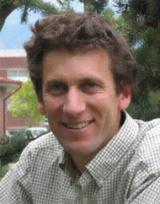Havlick a collaborator on Fort Carson research

David Havlick, associate professor, Department of Geography and Environmental Studies, UCCS, and Eric Perramond, associate professor of environmental science and Southwest studies, Colorado College, spent more than seven years tracking the efforts of the U.S. military to expand the Army base at Fort Carson and the rural resistance against it. The pair wrote “Militarized spaces and open range: Piñon Canyon and (counter) cartographies of rural resistance,” which recently published in the journalEnvironment & Planning D: Society and Space.
The piece examines how rural communities in Colorado have confronted military expansion. Havlick and Perramond note that although there has been a series of base realignments and closures during the past three decades, the Army base at Fort Carson has grown.
In 1983, Fort Carson expanded into a 95,500-hectare training area in southeastern Colorado known as the Piñon Canyon Maneuver Site. In 2006, the Army announced plans to expand the site by 169,000 hectares. Under the Army’s proposal, a significant portion of southeastern Colorado would be transformed into the largest Army training ground in the U.S. This prospect galvanized a diverse coalition of rural residents to oppose the Piñon Canyon expansion.
Havlick and Perramond’s research, begun in 2007, examines how the principal actors in this case — the U.S. Army and a rural citizen opposition coalition — mobilized different narrative and political strategies based on substantially contrasting cartographic representations to shape the debate and construct contested geographies of this space as military training ground versus open range.
The article notes that as of 2014, the expansion of the Piñon Canyon Maneuver Site is on hold, although there is no guarantee that the base or military area expansion will not proceed in the future.

